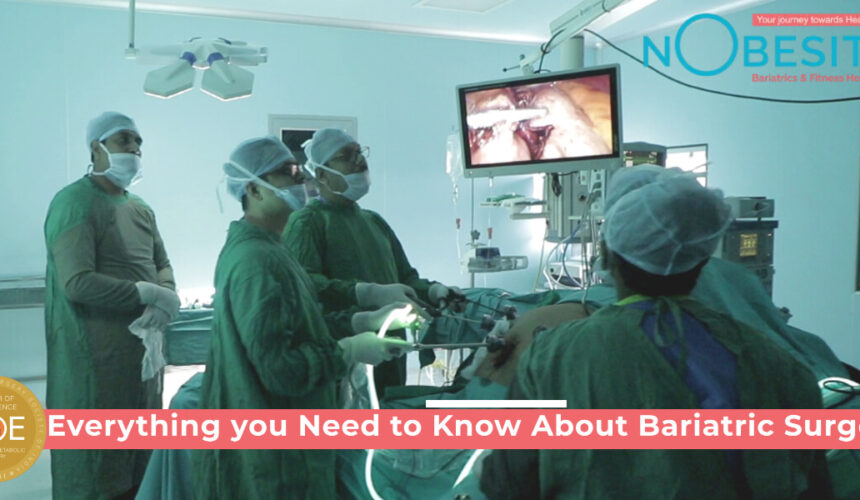
If you are morbidly obese, you can’t ignore this. Morbid Obesity leads to many deadly diseases. Bariatric surgery is an operation in which the gastric path is modified to lose weight.
Bariatric surgery is an effective and preferred way of weight loss. For many obese people, exercises and diets are proving futile. If you are one of them, you should consider undergoing Bariatric Surgery.
What Is Bariatric Surgery?
It is a surgical procedure in which the stomach’s food holding capacity is reduced, or it is bypassed which results in malabsorption of nutrients. It causes weight loss. In some bariatric operation, these both methods, i.e., gastric restriction and malabsorption, are used to increase weight loss. The selection of bariatric procedures depends on the patient’s obesity level.
This Surgery often causes hormonal changes that are beneficial to treat some deadly diseases like T2DM, obstructive sleep apnea, polycystic ovarian disease (PCOD/PCOS), infertility, hypertension etc. All types of bariatric surgeries have their advantages and disadvantages.
When Is It Time For Bariatric Surgery?
when you have tried all methods of weight loss, and neither of them worked, and you are suffering from diseases like Sleep apnea, hypertension, Type 2 Diabetes, Gastroesophageal Reflux, and Non-alcoholic Fatty liver disease, PCOS/PCOD, infertility due to obesity, it’s time for you to undergo weight loss surgery.
If you neglect these issues, it may increase your life’s struggle and result in severe conditions. So, it’s better to notice them and consult a doctor.
Who Can Undergo Bariatric Surgery?
Bariatric Surgery though should be the last option but it is the best option for weight loss. It is not for every obese people. If you have these conditions, then you can choose bariatric Surgery;
- Your BMI is 37.5 or more than 37.5.
- Your BMI is 32 to 37.5 , and you are suffering from severe weight-related health issues like Type 2 Diabetes, high blood pressure, cardiovascular diseases, or severe sleep apnea.
- You can undergo bariatric Surgery in special cases if you have BMI 30 to 34 and have incredibly severe weight-related health problems.
You have to meet some medical guidelines and criteria to qualify for Bariatric Surgery. The screening procedure for bariatric surgery is simple, and patients must make some simple but permanent changes in their lifestyle. The patient should be required to participate in long-term follow-up plans like diet plans, lifestyle changes, and medical conditions.
How to Prepare For This Surgery?
If you meet the medical requirements for bariatric surgery You may have to do some lab tests and radiological reports before this Surgery, and the doctor may put medications if the lab tests are abnormal. You have to stop any tobacco or alcohol consumptions. The doctor will provide you detailed instructions about Dos and Don’ts before the operation.
The following are some common bariatric surgery procedures.
- Gastric Bypass:

This Surgery is performed in two stages. The first stage involves the creation of a small stomach pouch. This pouch is created by diving from the top of the stomach from the rest. The small intestine’s first portion is divided from the rest and connected to the new small stomach pouch in the next stage. This new route bypasses the major portion of stomach and a very small portion of small intestine. So this surgery helps in restricting the quantity of food you eat as well as less calories are absorbed from your food. Due to this new routing of food, the hunger hormones (like ghrelin) are supressed and you feel less hungry and also some good hormones(like GLP 1) are released which makes you feel full after eating small quantity of food and also help you in controlling your diabetes.
The patient can lose approximately 60 to 90 percent of excess body weight by this operation (result may vary from person to person). This procedure reduces appetite and helps in maintaining weight for long time
- Sleeve Gastrectomy:

In this Surgery, a significant part of the stomach is removed, and a small banana-shaped stomach pouch is created. The new banana-shaped stomach pouch holds less food and drinks than the normal stomach, which reduces the consumed calories.
This procedure also affects some hormones, satiety, and blood sugar.
- Duodenal Switch Gastric Bypass:

The biliopancreatic diversion with duodenal operation has two components. Firstly, a tabular stomach pouch is created with the top of the stomach, similar to sleeve gastrectomy. Then a significant part of the small intestine is bypassed to reduce the absorption of food.
This procedure provides more significant weight loss than other bariatric surgery. It helps to reduce approximately 60 to 70% of the weight. In the long run, patients can eat regular meals after this operation. It reduces 70% of the fat absorption from the food. This bariatric surgery is beneficial to treat type 2 diabetes in comparison to other procedures. But this procedure has more long term nutritional problems compared to other procedures.
- Mini gastric bypass
Mini gastric bypass is minor modification of standard Roux-en-Y gastric bypass. In this surgery a loop of small intestine is joined to previously made small pouch of stomach. It also works on same principles of gastric bypass.
After Bariatric Surgery:
These risks can be bifurcated as short-term and long-term risks.
Short term risk includes complications associated with the surgical operation;
- Excessive bleeding
- Infection
- Adverse reaction to anesthesia
- Blood clots
- Lung or breathing problems
- Leaks in your gastrointestinal system
- Death (extremely rare)
Long term risks include;
- Bowel obstruction
- Gallstone
- Hernias
- Low Blood Sugar
- Malnutrition
- Ulcers
- Vomiting
- Acid Reflux
- Bariatric Revision surgery
- Death (extremely rare)
Click here to check: MYTHS & FACTS ABOUT BARIATRIC SURGERY
It is all about bariatric surgery, its type, and other relative information. For more details, queries, and questions, you can consult our specialist at NObesity. Thank you!
Give us a Call: +91-9925558543, +91-8999949999 for Surgery for Weight Loss and Say NO to Obesity with NObesity.








